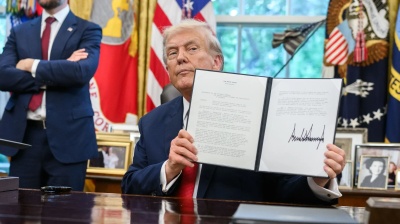Venezuela's government detained seven foreign nationals, including two Americans, in the latest escalation of tensions before President Nicolas Maduro's contested swearing-in ceremony on January 10.
Making the announcement on state television on January 7, Maduro said the group - which allegedly included two Colombians described as "hitmen," a “senior FBI agent” and three veterans of the Ukraine conflict - were captured while plotting unspecified acts of terrorism. The claims come as the oil-rich nation faces mounting domestic and international pressure over July's disputed presidential election.
The detentions coincided with opposition leader Edmundo Gonzalez Urrutia's diplomatic tour seeking recognition from regional governments. Hours before the arrests, he met with US President Joe Biden, who endorsed him as the "true winner" of the July vote. Gonzalez also spoke with Trump administration representative Mike Waltz at the White House.
Washington on January 8 dismissed Maduro's claims of American involvement in an alleged terror plot, hours after Caracas announced the detention of two US citizens among seven foreign nationals.
"Any claim that the United States is involved in a plot to overthrow Maduro is categorically false," a State Department spokesperson said, expressing concern over the arrests while citing privacy restrictions that prevent sharing detainee details. "The United States continues to support a democratic solution to the political crisis in Venezuela."
In what observers describe as a widening crackdown, security forces have also targeted opposition figures' families. Gonzalez Urrutia's son-in-law vanished earlier this week after being intercepted by black-clad men during the morning school run, while agents reportedly surrounded the home of opposition figure Maria Corina Machado's elderly mother, deploying drones and cutting electricity to the area.
The government has fortified the capital ahead of rival demonstrations planned for January 9 by deploying 1,200 troops across Caracas. Pro-Maduro militia members sporting Russian-made assault rifles paraded at the presidential palace, while opposition leaders called for "millions" to protest the inauguration.
Defence Minister Vladimir Padrino's recent declaration of unwavering military loyalty to Maduro has dampened opposition hopes of institutional support. Previous post-election protests in July resulted in over 20 deaths and 2,400 arrests, with roughly 900 individuals remaining in custody.
The opposition has accused Maduro’s administration of rigging the election and has presented tally sheets covering 80% of votes to substantiate Gonzalez’s victory. International observers, including the United Nations and the Carter Center, have criticised the lack of transparency, as the regime-aligned National Electoral Council (CNE) has yet to release detailed voting records.
The long-standing crisis has prompted an exodus of over seven million Venezuelans - nearly a quarter of the population - despite the country's vast petroleum reserves. Maduro and his predecessor Hugo Chavez have maintained power for 25 years through a combination of populist policies, contested elections, and security force backing.
Venezuela recently freed 10 Americans in a prisoner swap that saw Washington release Colombian businessman Alex Saab, a close Maduro ally. Neither the US State Department nor Colombian officials have commented on the recent arrests.
Local rights groups warn of a "revolving door" policy where new detentions occur even as previous prisoners are released. Maduro claims his forces have captured 125 "mercenaries" from 25 countries in recent months, though he has provided no evidence to support these assertions.
As the January 10 inauguration approaches, the 62-year-old authoritarian leader appears poised to begin another six-year term, despite widespread claims of electoral fraud and growing international isolation.
News

Trump would like to meet North Korea’s Kim Jong Un during Asia trip
The prospect of renewed diplomacy between Washington and Pyongyang has lingered since Kim’s remarks last month suggesting a willingness to speak to the outside world.

Bill Gates makes surprise Indian TV debut
In a move set to spark both intrigue and curiosity, Microsoft co-founder and philanthropist Bill Gates has made a cameo appearance on Indian television, entering the iconic drama series Kyunki Saas Bhi Kabhi Bahu Thi 2.

Queen Sirikit of Thailand dies
The death of Queen Sirikit of Thailand has marked the end of an era for the Thai monarchy. According to an official statement from the Bureau of the Royal Household of Thailand, Her Majesty died at 9.21 pm on October 24.

Pakistan, the latest in Asia to see gold prices plummet
In international trading, the precious metal lost $35 per ounce to settle around $4,115, extending a week-long slide triggered by shifting expectations over US monetary policy.
_1761305900.jpg)


